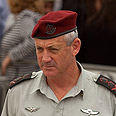
During a Knesset Foreign Affairs and Defense Committee debate Tuesday on the possibility of an Israeli attack on Syria's stockpiles of chemical weapons, IDF Chief of Staff Lt.-Gen. Benny Gantz said the army may find it difficult to launch a "pinpoint" attack and warned that any other strike in Syria may drag the Jewish state into a broader regional conflict.
Gantz told the committee that Syrian President Bashar Assad's regime has boosted protection around its chemical weapons stockpiles and that the weapons have not landed in the hands of "negative elements" as of yet.
Related stories:
- Rebels: Assad moved chemical weapons to border
- Syria: Chemical weapons only for foreign attack
- US: Assad still controls chemical weapons
"But this situation may change," he stressed, "and then we will be faced with a dilemma."
Gantz said Israel must also consider "who will remain after we act and in whose hands (the weapons) will land."
Addressing the civil war in Syria, the army chief said Iran and Hezbollah have provided substantial assistance to Assad's forces – including weapons - but added that the defections of top commanders are hurting the Syrian army and motivating the rebels.
Earlier, the rebel Free Syrian Army said the Syrian government has moved chemical weapons to airports on its borders.
"We in the joint command of the Free Syrian Army inside the country know very well the locations and positions of these weapons," a statement from the FSA said.
"We also reveal that (President Bashar) Assad has transferred some of these weapons and equipment for mixing chemical components to airports on the border."
The statement said the weapons had been moved in a bid to pressure the international community, much of which has called for Assad to step aside in the face of a 16-month uprising against his rule.
Earlier this week, Prime Minister Benjamin Netanyahu said that the "great threat" to Israel from the Syrian conflict is that the Damascus government may collapse and its stock of chemical weapons and missiles fall into the hands of the Lebanese Islamist group Hezbollah.
Interviewed on the US "Fox News Sunday" television program, Netanyahu said Syrian President Bashar Assad's government would fall, but he was more concerned about a chaotic "regime collapse" that would leave Syria's weapons sites unguarded than a regime change.
Moran Azulay contributed to the report
- Receive Ynetnews updates
directly to your desktop















